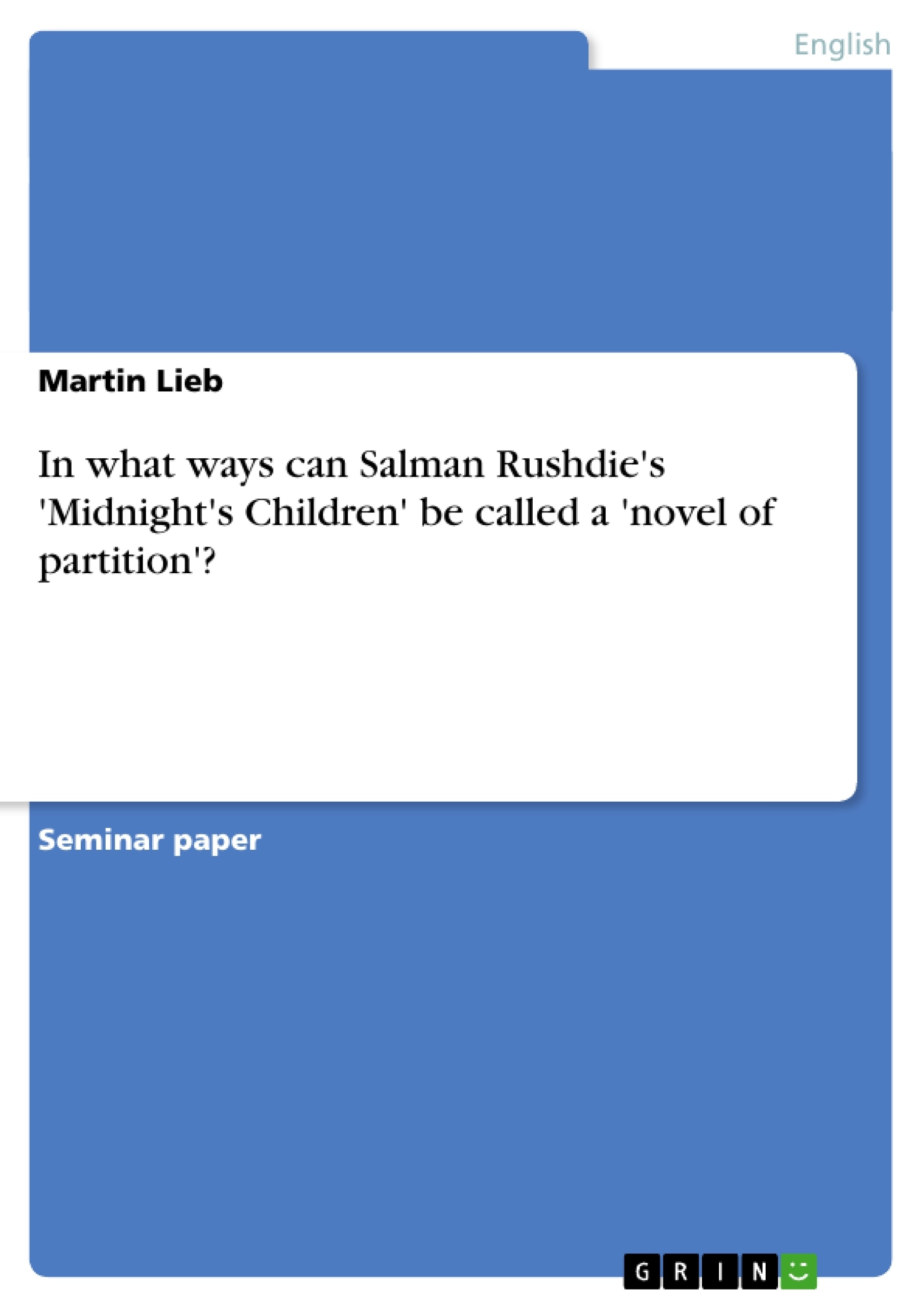I will not quite deal with the novel just under this focus, as the question was probably intended to be, but I will also discuss the book under the aspect of East and West, Orient and Occident ( if such separations are possible is certainly another question), and maybe make some references to Rushdie’s more recent novels the ground beneath her feet and Fury.
Midnight’s Children tells the life story of two children who are born exactly at the stroke of midnight on August 15th 1947, the day India and Pakistan achieved their independence from Great Britain, in a Hospital in Bombay. They are exchanged at birth, and so the narrator, Saleem Sinai, grows up in a well-to-do Muslim family, while his later rival, Shiva, has to live in a low-caste Hindu environment. Shiva is not even raised by Saleem’s biological father, since his wife, who dies right away, has been unfaithful to her husband with a departing English colonist. Rushdie intermingles the life and family story of Saleem, who tells it, orally and in his probably dying days, to a young woman named Padma, with the history of the Indian subcontinent in his 30 years of life. Together with India, 1001 children
( see the reference to Princess Scheherezade and the Oriental, Arabian Stories of 1001 Nights) are born in the hour of midnight, who all develop special gifts, one can travel through time, the over can change sexes and Saleem becomes capable of telepathy, which makes him an omniscient narrator and, with Shiva closest to midnight and so most powerful, the possible head over the “midnight parliament”, in which he could gather all the Midnight’s Children to save the nation, but the project is not undertaken, because it would reveal Shiva, now a brutal killer and India’s greatest war hero, the truth about his parents.
In this summary of the plot, which is not totally correct, I think, I have already done a little bit of interpretation, but now I will devote myself fully to the discussion of the essay question and the differences between East and West, as presented by Rushdie, and maybe point to a few developments he seems to have made in his recent novels.
Inhaltsverzeichnis (Table of Contents)
- I. Introduction
- II. Main Part
- Partition
- III. Resumé
- IV. Bibliography
Zielsetzung und Themenschwerpunkte (Objectives and Key Themes)
This essay explores Salman Rushdie's Midnight's Children, specifically examining how it can be described as a “novel of partition.” The essay will also delve into the novel's portrayal of East-West relations and Orient-Occident interactions, possibly drawing parallels to Rushdie's later works.
- The Partition of India and Pakistan
- East-West Relations and Orient-Occident Interactions
- The Interplay of Reality and Fiction
- The Role of Colonialism and its Impact on Indian Identity
- The Relationship Between the Personal and the Political
Zusammenfassung der Kapitel (Chapter Summaries)
The introduction delves into the novel's central question: how Midnight's Children functions as a “novel of partition.” It sets the stage for analyzing the novel through the lens of East-West relations and the complexities of Indian identity. The essay then provides a brief overview of the novel's plot, focusing on the birth of Saleem Sinai, the protagonist, and his intertwined fate with India's independence and the partition.
The main part focuses on the concept of partition, exploring how it manifests in the novel's narrative and characters. It examines how the partition's historical context is intertwined with the personal lives of the characters, particularly Saleem's own complicated family history and heritage. The essay further analyzes how the novel uses the concept of rebirth and double parentage as metaphors for the complexities of Indian culture and identity.
Schlüsselwörter (Keywords)
Key terms and concepts explored in the essay include partition, East-West relations, Orient-Occident interactions, colonialism, Indian identity, rebirth, double parentage, reality and fiction, and the interplay between the personal and the political.
Frequently Asked Questions
Why is "Midnight's Children" called a "novel of partition"?
The novel's plot and characters are inextricably linked to the historical partition of India and Pakistan in 1947, reflecting the cultural and political trauma of that event.
Who is Saleem Sinai?
He is the narrator and protagonist, born exactly at the stroke of midnight on August 15th, 1947, whose life mirrors the history of the Indian subcontinent.
What is the significance of the "1001 children"?
It is a reference to the Arabian Nights; these children born in the first hour of independence possess magical gifts, symbolizing the potential and diversity of the new nation.
How does Rushdie explore East-West relations?
The novel examines the impact of British colonialism on Indian identity and the complex interactions between Oriental and Occidental cultures.
What role does "double parentage" play in the story?
The exchange of babies at birth serves as a metaphor for the hybridity and complex heritage of post-colonial Indian culture.
- Quote paper
- Martin Lieb (Author), 2003, In what ways can Salman Rushdie's 'Midnight's Children' be called a 'novel of partition'?, Munich, GRIN Verlag, https://www.hausarbeiten.de/document/91579


